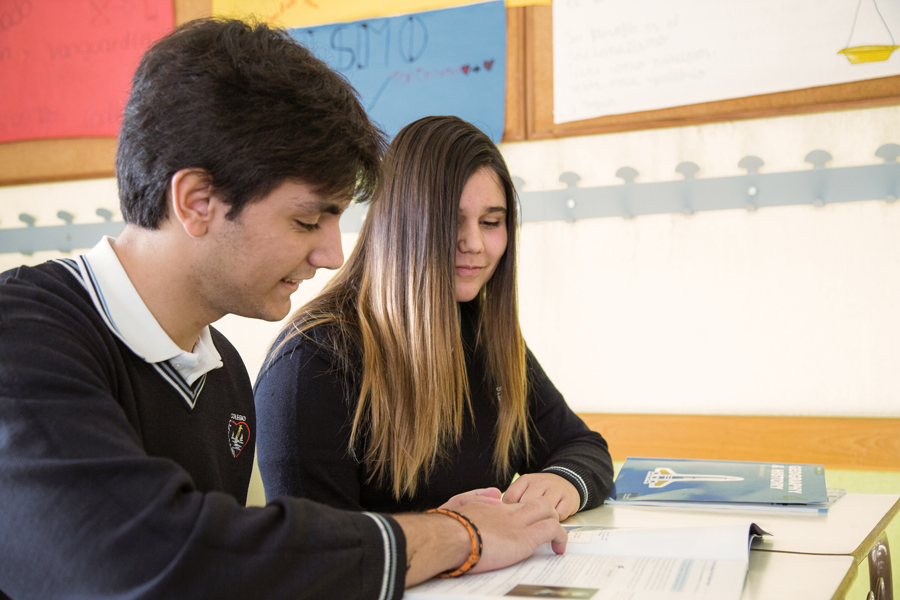What it is really like to study at a school with a Bilingual Programme? There are many different answers to that question. To discover more about these diverse realities, we decided to start by talking to two students living one of these realities in Madrid, and to ask you as CLIL teachers what your reality looks like.
In January 2018, we visited Santa Francisca Javier Cabrini School, a partially subsidised private school (concertado) in the North of Madrid, to speak to two students in their 4th year of Secondary (4º ESO). These two students have followed a Bilingual Programme since Nursery school (Infantil). They told us why they feel motivated to work hard and make the most of their Bilingual Education.
Interview with Raquel Villora Gómez, 15
How long have you been studying in a Bilingual Programme?
Since I was about 5 years old. Our year group was the first one at this school to follow the Bilingual Programme from the beginning of our education.
Which subjects do you study in English?
It depends on the year. Our school changes the subject we study in English each year so that some years we study the content in Spanish. This year I have 10 hours a week in English, including Technology & IT, English Language and History.
Do you think the Bilingual Programme has been positive for you?
Definitely. I think it will be very important for me to speak English to get a job in the future. Also, learning a second language in this way gives you empathy towards others who are not able to fully express themselves in a second language when they need to. I think the Bilingual Programme is a good idea because, this way, I learn English and History, for example, at the same time.
How does the Bilingual Programme work at your school?
At our school all students follow the Bilingual Programme. There is a normal programme and an advanced programme. Most of us are in the Advanced Programme, and some of us are working towards getting the Advanced Certificate by the end of 4º ESO.
Which is the easiest accent for you to understand in English?
The Scottish one! Our History teacher is Scottish, and for me, that is the easiest accent to understand. However, some of our teachers for English content classes are Spanish, and we have American Language Assistants. We also listen to the Talking Book in our textbook to hear an English accent.
What do you do to improve your English outside of school?
We spent a week in an English school one year, attending normal class with our English “buddies” which was really interesting, but I’ve never had additional classes or tutoring outside of school. I just study a lot, and listen to English music. I really like Ed Sheeran!
Interview with Cayetano Ramos Martín, 15
Do you find it difficult to study core curricular subjects in English?
Not really, because our textbook Inicia is very clear and includes helpful vocabulary boxes, or I can guess from the context what a word means. If I don’t know a word when I’m doing homework, I look it up in an online dictionary because my parents don’t speak English.
Do you think speaking English fluently will be helpful to you in the future?
I would like to become an engineer, but I think speaking English is always useful because it is the most universally spoken language. If you speak English, you can always communicate with people.
Does your school offer you any extra ways to improve your English?
In my class, some of us are preparing for the Advanced Certificate, so we have additional classes with the language assistants after school once a week. Also, we went to Ireland with our school for a week last year and stayed with host families – that was fun!
Do you do practise English in your free time?
I watch shows on Netflix in English, without subtitles, and I read basketball blogs sometimes. But I don’t have that much time – we have a lot of subjects to study!
Do you think Bilingual Education is a good idea?
Yes. I think it’s very important to speak English these days, and learning normal subjects in English is a good way to do this because you have to think and analyse in English. I would recommend this kind of education.
Do you have any advice for younger students studying in a Bilingual Programme?
My little brother is also in this programme and I tell him “You have to study!”
TOP STUDY TIPS FROM THE STUDENTS:
- To learn in a less pressured way:
Do things you enjoy in English in your free time, like watching a TV series in English without subtitles, listening to music or reading sports blogs. - To improve understanding:
Use online dictionaries for reference and try to listen to a range of different accents. - To prepare for exams:
Make study notes that you find helpful to learn from. Raquel makes multi-coloured notes organised into sections; Cayetano makes a visual mind map for each unit. - To better your level:
Practise as often as you can, read a lot and work hard!
What is your CLIL reality?
What does the Bilingual Programme look like at your school? Do your students think that learning core curricular subjects in English is beneficial? What do they most enjoy or struggle with? With a view to always bettering our offer to meet your needs, we would like to hear about your reality at a school with a Bilingual Programme.
Write to us at oxfordeducacion@oup.es to share your experience!


Recent Comments